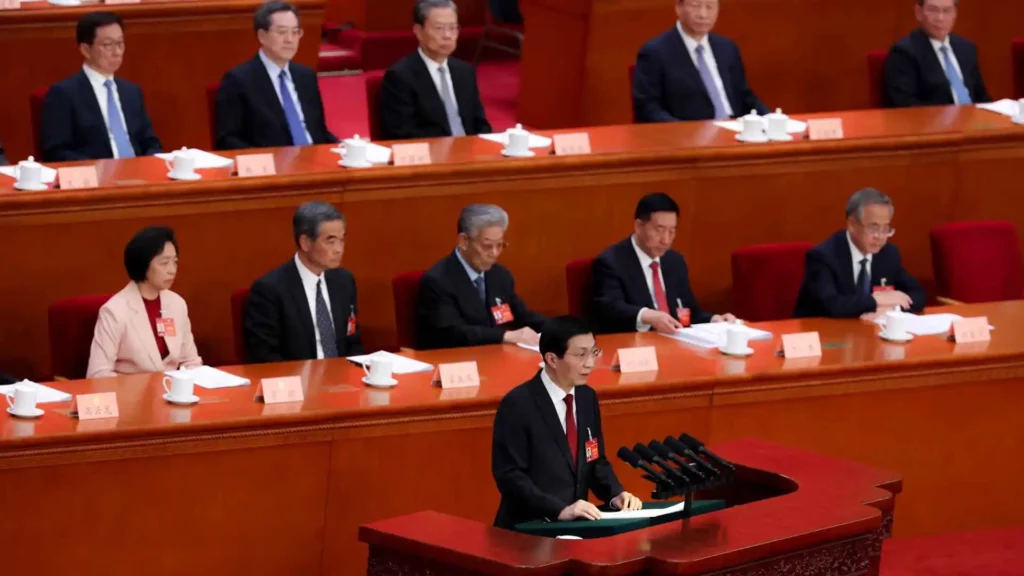Tether Stablecoin Could Bypass Financial Censorship As Nations Crack Down On Telegram

The Communist Part of China has spent years trying to block access to Telegram. Photo by Lintao Zhang/Getty Images.
Key Takeaways
- Apple has removed WhatsApp, Threads, Signal and Telegram from the App Store for Chinese iPhone users under pressure from the government.
- Meanwhile, Telegram is integrating USDT payments after the stablecoin launched on TON.
- Unlike some messaging apps and payment services, the Chinese state has little power to control Telegram or USDT.
Alongside WhatsApp, Threads and Signal, Telegram has been removed from Apple’s App Store in China as the government cracks down on encrypted messaging platforms.
Although China adds to a growing list of countries where the government has sought to restrict Telegram, the platform continues to add new features, like the integration of USDT for peer-to-peer payments, that allow users to circumvent censorship.
Messaging Apps Cast Outside the Great Firewall of China
The move to restrict access to Telegram and other messaging services represents the latest chapter in the state’s ongoing war on foreign-operated messaging apps.
The government first blocked the Telegram web app in 2015, when the state-run news outlet, People’s Daily, reported that activist lawyers used the platform to organize “attacks on the [Communist] Party and government.”
Since then, Telegram has remained a key tool for dissidents seeking to bypass state surveillance. And until now, Chinese iPhone users could still access the platform with a VPN.
Telegram and Chinese Censorship
Telegram has long touted its end-to-end encryption as an important privacy tool and claims that no governments are able to read messages via back doors. For this reason, it has become a bane to authoritarian regimes the world over and has been banned in Iran, North Korea and Russia. (Although the latter has since lifted restrictions.)
In contrast, China’s most popular messaging platform – WeChat – is closely integrated with the country’s state surveillance apparatus.
This may explain why other apps that don’t have such a reputation for being used to oppose the government have also been booted off the App Store. Although Telegram may pose the greatest threat to Chinese censorship, Beijing’s s general strategy is to restrict access to any social media it can’t effectively monitor and control.
However, decentralized blockchain networks like Bitcoin and TON pose a direct challenge to such state control.
Peer-to-Peer Payments
Resistance to censorship is arguably the single most important benefit of decentralization, but text-based communications aren’t the only things that can be censored.
For instance, Bitcoin was founded on the simple principle of creating a peer-to-peer payment network that bypasses banks and other centralized intermediaries.
A decade-and-a-half later, many of the blockchains that followed, including the Telegram-associated TON, have maintained that same commitment to censorship resistance through decentralization.
Using the platform, Telegram users can easily send each other cryptocurrency without fear of their transactions being blocked. But until now, TON’s functionality as a payment platform was limited to the blockchain’s native asset: Toncoin.
USDT Launched on TON
Last week, Tether CEO Paulo Ardoino joined Telegram founder Pavel Durov to announce that USDT was being launched on TON, bringing peer-to-peer stablecoin payment to Telegram for the first time.
“We’re excited to bring USDT to The Open Network (TON) because we support its vision of an open and decentralized internet and a borderless financial system,” Ardoino said.
In an announcement , the TON foundation stated that “this move supports TON’s mission to put crypto in every pocket and integrate ‘under the hood’ Web3 services into the daily lives of Telegram users.”
Of course, USDT isn’t resistant to censorship in the same way Bitcoin is. Tether can always freeze assets and has done so on many occasions at the request of governments. But the stablecoin has already been banned in China. So the government has little leverage against the company that issues it. For those in China who want to get around restrictions, it can certainly be a powerful tool.
In the end, centralized entities are always the weak point in efforts to bypass Chinese surveillance and censorship. The state may be unable to prevent people from using crypto, but it can crack down on the exchanges they use to purchase it. Those who want to will also find a way to carry on using Telegram, but without App Store support, usage will certainly decline.


